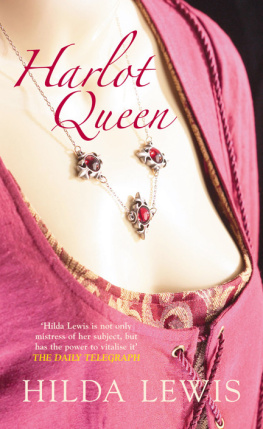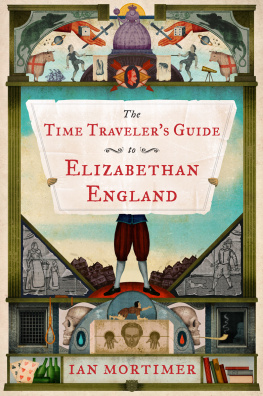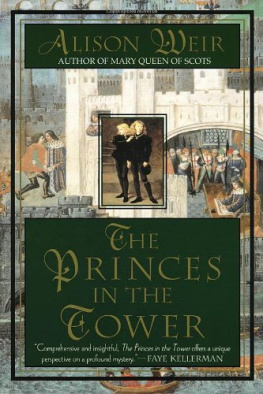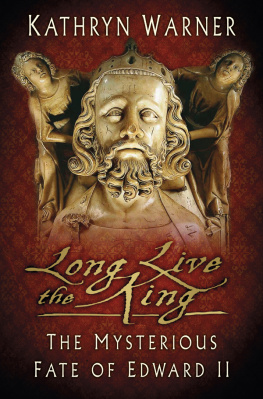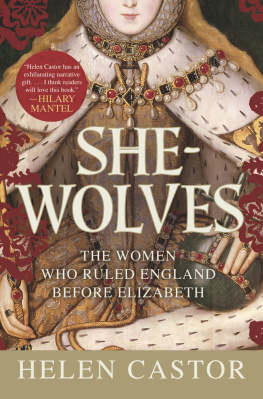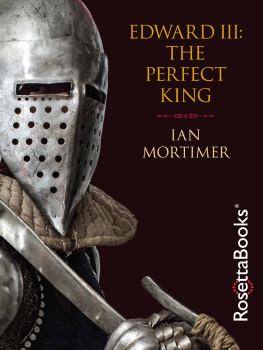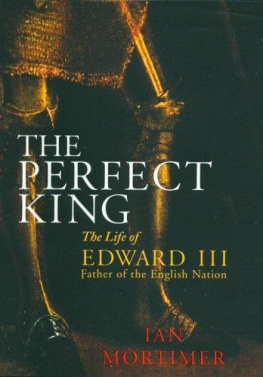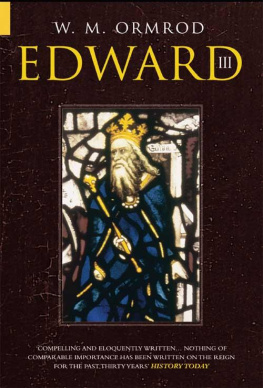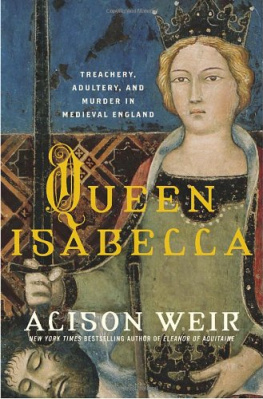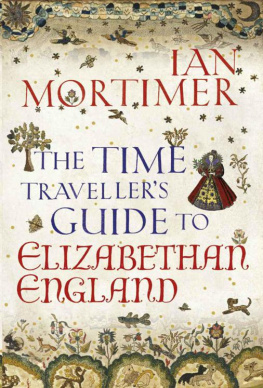Harlot
Queen
About the Author
Hilda Lewis was one of the best-known and best-loved of all historical novelists, known for her authentic application of period detail to all her books. She was born in London and lived for much of her life in Nottingham. She wrote over 20 novels and died in 1974.
Harlot
Queen
HILDA LEWIS
To Edith M. Horsley with my warmest thanks for the understanding, the knowledge and interest she has shown throughout the writing of this book.
Cover Illustration: Copyright 2006 Alamy Ltd. All rights reserved.
This edition first published 2006
The History Press
The Mill, Brimscombe Port
Stroud, Gloucestershire, GL5 2QG
www.thehistorypress.co.uk
This ebook edition first published in 2011
All rights reserved
Hilda Lewis, 1970, 2006, 2011
The right of Hilda Lewis, to be identified as the Author of this work has been asserted in accordance with the Copyrights, Designs and Patents Act 1988.
This ebook is copyright material and must not be copied, reproduced, transferred, distributed, leased, licensed or publicly performed or used in any way except as specifically permitted in writing by the publishers, as allowed under the terms and conditions under which it was purchased or as strictly permitted by applicable copyright law. Any unauthorised distribution or use of this text may be a direct infringement of the authors and publishers rights, and those responsible may be liable in law accordingly.
EPUB ISBN 978 0 7524 8038 1
MOBI ISBN 978 0 7524 8037 4
Original typesetting by The History Press
Contents
Acknowledgments
My grateful thanks to D. Alice Clarke of Nottingham University for her unfailing patience with all my enquiries and especially for finding me the copy of the Kings poem. To the Marquis of Bath my thanks for allowing me to see the original MS. at Longleat. My thanks also to L. F. Craik for finding me the drawing of Isabellas coat-of-arms, to Captain P. A. Burgoyne for allowing me to use his fine painting of that coat-of-arms and to Grant Uden whose kindness made this possible.
Foreword
I, Isabella of France,
in the sight of God and of this congregation
do hereby plight my troth
The child, fully aware of the importance of the occasion, though not at all of the implication, repeating the words after my lord bishop of Narbonne, declared her willingness for this betrothal between herself and Edward of Carnarvon, heir to the great first Edward. At her left hand stood my lord earl of Lincoln, at her right, my lord count of Savoyproxies both for the absent groom. Quiet and grave she perfectly played her part; but behind her still face the thoughts ran tumbling. Was she to wed these two lordsand they so old? And both at onceand how might that be done? And where did Edward, Prince of Wales come into this? She had thought it was him she was to wed; she had looked to be Queen of England one day. Still, the King her father must be obeyed. So now she put one hand within that of my lord of Lincoln and the other within that of my lord of Savoy. And, troth plighted, went to make her curtsey to her father, to her mother and to the lord archbishop.
A pretty, obedient child. Who could guess at the dark chapter this betrothal should now unfold? Not the King nor Queen nor archbishop; not the grooms father eager for the marriage, still less the young groom; and, least of all, the puzzled little girl herself.
The date was the twentieth of May in the year of grace thirteen hundred and three. The place was Paris; the unknown groom nineteen, the promised bride nine years old.
PART ONE
The King and Gaveston
Queens gambit
I
Edward, new-come to the throne of England, Scotland and Ireland, lord of Normandy, Ponthieu, Gascony and Aquitaine stirred and flung out his arms. His hand touched the head of the sleeper at his side. He turned on his elbow, keeping the fur bedcover about him, for the January morning was cold; his hand went out to stroke the dark head and then drew back lest it disturb the sleeper; he settled himself down to the warmth of the bed and the beloved body at his side.
Piers. Piers Gaveston. Hed got Piers back. It was the first thing hed done after his fathers death; the breath hardly out of the old mans bodyand there was Piers back again in England. Last winter his father had driven Piers away
At the thought of the old King the young Kings face darkened. The old man, old and cold and fierce and hard I was always afraid of him. So big, so tall. When I was a child he seemed to reach up to the skyas though he could thrust his head through the clouds and talk to God. I used to think God did surely whisper in his ear; he knew everythingeverything a boy did or even thought. And of course he did know everythingthough it was not God that told him. And everything a boy did or thought was wrong. And it was always discipline discipline. I sickened at the word. I used to think blood didnt flow in those veins of his but some dark physic
But it was the treatment of Piers that turned dislike into hatred. Ungrateful for gallant service in his Flanders wars, the old man sent Piers across the seas; banished. And yet, once he thought well of Piers; made him an esquire in the royal household. And then because Piers was poor and proud sent him to join the palace boys, young nobles all, being trained with me, myself, for knighthood
Edward lay back remembering the first time he had ever set eyes on Piersthe handsome face, the friendly face. Friendly. It was the thing that made Piers different from all the others.
A prince has no real friends. People were respectful; or, when they dared, despised me and still they do because I like to take life easy. And why not? When theres work to doI do it. I did well in the Scottish wars though I didnt like fighting and never will. Even that hard-bitten old soldier, that father of mine, praised me. Till Piers came I hadnt a friend. Those palace boys! They bowed their backs because their future lay in my hands, but no-one was ever my friend; too scared of the old man. But Piers was different. He wasnt afraid of anyone, ever! The first moment I set eyes on him I wanted to run to him, clasp him in both arms, to call him brother
And he remembered how, overcome by sudden love, hed stood dumb; and how, in that moment when Piers had bent to his princes hand, a flame had sung in his blood, and not all the winds of persecution could put it out.
And he remembered how Piers had stood out above all the palace boys. He was the oldest; he was skilled in every manly sport. He shone above them allabove his prince even, himself no mean sportsman. Everyone had liked Piers at first. He had held them all by his charm and by his wit, and by tales of the fighting in Flanders.
He kept us all in fits of laughter by his wicked wit. But what he didnt understandand doesnt understandis that people laugh only when the needle pricks others; when it pricks themselves it isnt so funny. And another thing they held against himand still do holdis what they call his greed. They didnt understand and never will, his poverty. Those things others have as a matter of course, were never his. Between his wit and his need, his charms wore thin. And so the mischief started. It wasnt hard to turn my father against him; Piers pride, Piers tonguehis own worst enemy.
But not for me. I held him dear. I hold him dearer now; of all men dearest. I stood by him, I defended him, yes even to my father; I was stung by the old mans injustice. I asked for the rewards Piers services deserved; I asked for lands in Ponthieu with all their honours, all their moneys. Too much, perhaps? But others had got more and done lessso much less. Resultthe old mans cold rage; banishment for Piers, and for myself

